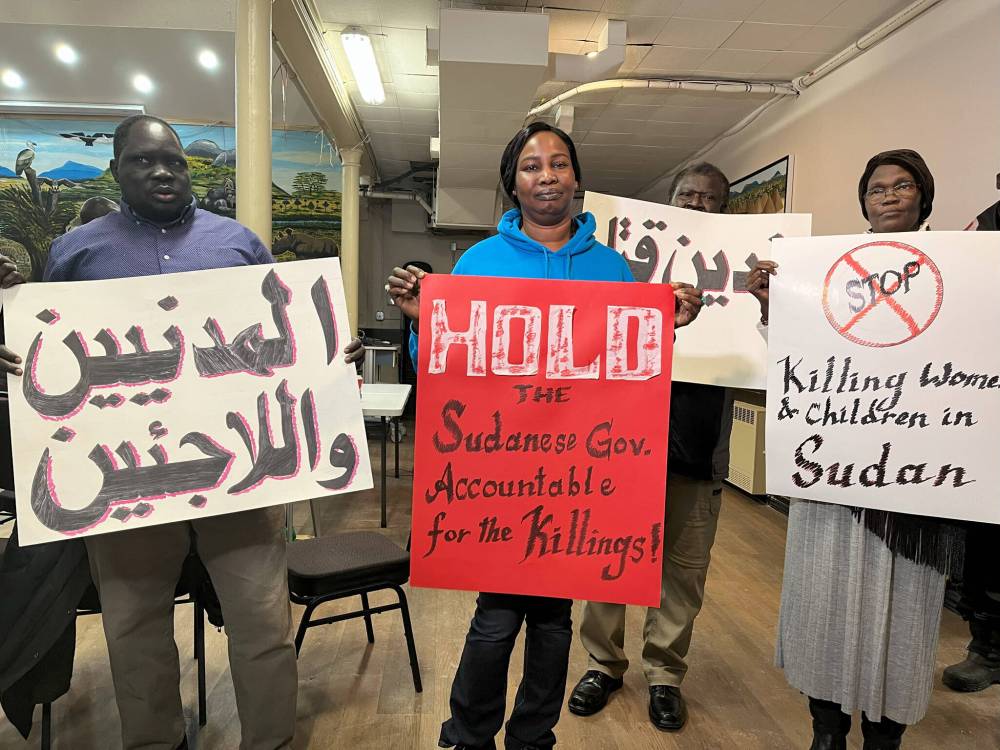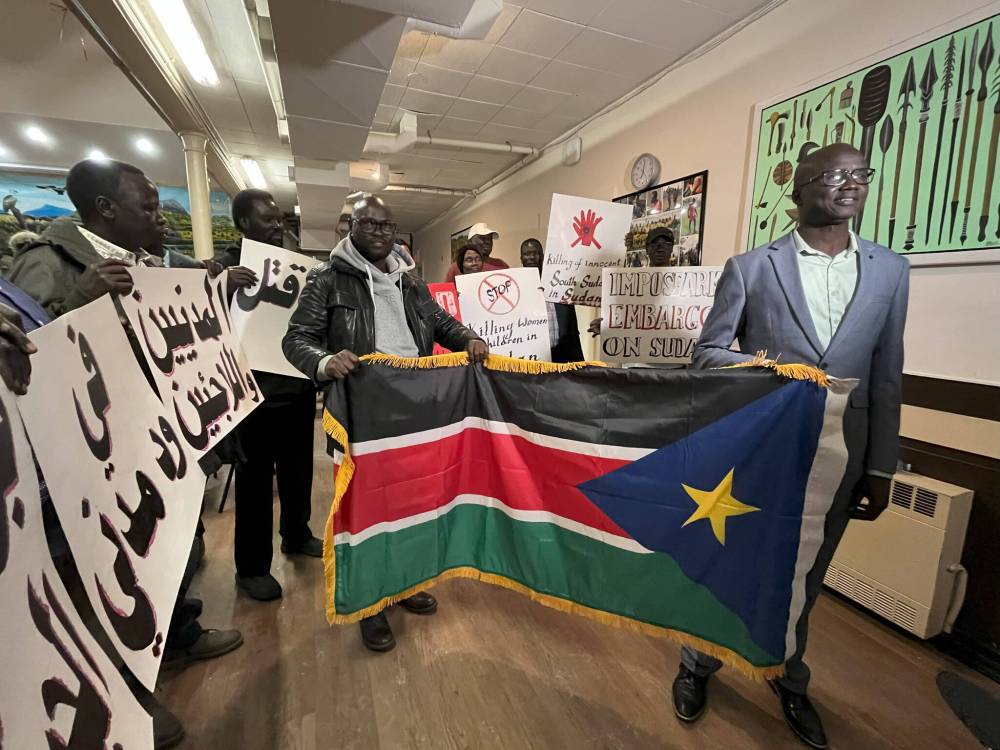Local community gathers at centre to pray for victims of violence in South Sudan
Advertisement
Read this article for free:
or
Already have an account? Log in here »
To continue reading, please subscribe:
Monthly Digital Subscription
$1 per week for 24 weeks*
- Enjoy unlimited reading on winnipegfreepress.com
- Read the E-Edition, our digital replica newspaper
- Access News Break, our award-winning app
- Play interactive puzzles
*Billed as $4.00 plus GST every four weeks. After 24 weeks, price increases to the regular rate of $19.00 plus GST every four weeks. Offer available to new and qualified returning subscribers only. Cancel any time.
Monthly Digital Subscription
$4.75/week*
- Enjoy unlimited reading on winnipegfreepress.com
- Read the E-Edition, our digital replica newspaper
- Access News Break, our award-winning app
- Play interactive puzzles
*Billed as $19 plus GST every four weeks. Cancel any time.
To continue reading, please subscribe:
Add Free Press access to your Brandon Sun subscription for only an additional
$1 for the first 4 weeks*
*Your next subscription payment will increase by $1.00 and you will be charged $16.99 plus GST for four weeks. After four weeks, your payment will increase to $23.99 plus GST every four weeks.
Read unlimited articles for free today:
or
Already have an account? Log in here »
Hey there, time traveller!
This article was published 25/01/2025 (261 days ago), so information in it may no longer be current.
Arek Manyang arrived in Winnipeg from Sudan in 1998, before the country was split into Sudan and South Sudan. Today, she calls her family back home nearly every day, terrified that the growing civil war in the region will reach the people she loves.
“Just hearing what’s going on there, you can hear some gunshots on the phone when you’re speaking with your family back home,” she said Saturday.
Manyang joined around 50 people at the South Sudanese Community Centre Saturday to call on the provincial and federal government to step in against the fighting between the Sudanese army and the paramilitary group Rapid Support Forces, which began in April 2023 but exploded last week when riots broke out after social media videos emerged purportedly showing South Sudanese people murdered in Gezira state.

MALAK ABAS / FREE PRESS
Arek Manyang (centre) chose to attend Saturday’s gathering at the South Sudanese Community Centre to call for justice for her family, who still lives in South Sudan, and others suffering.
South Sudanese authorities imposed a dusk-to-dawn curfew on Jan. 17 and ordered a social media ban in the region for at least 30 days beginning week, hoping to stop retaliatory violence.
South Sudanese and other non-Arab groups have been targeted by the Sudanese Armed Forces based on their skin colour and faith, said Reuben Garang, the president of the Council of the South Sudanese Community of Manitoba.
“To kill vulnerable people, people who are not fighting them, just killing them simply because they are South Sudanese, this is not acceptable,” he said. “They need to embrace human right values, because they can not continue with this.”
The Sudanese civil war has resulted in one of the world’s largest humanitarian crises. More than 28,000 people have been killed since April 2023 and millions of people have been displaced, resulting in famine across the region.
On Jan. 7, the U.S. Secretary of State Antony Blinken said the Rapid Support Forces had committed genocide, saying the war had “deprived communities of basic needs and services, and led to these horrible crimes.”
In December 2023, Blinken said both the Sudanese Armed Forces and Rapid Support Forces had committed war crimes.
In April 2024, Canada sanctioned some militants and companies in Sudan, but faced criticism for not targeting foreign groups allegedly providing weapons to militants.
In December, Foreign Affairs Minister Mélanie Joly and Minister of International Development Ahmed Hussen released a joint statement calling on all parties to “end hostilities and to engage in mediation efforts to address the conflict” in Sudan, but stopped short of declaring it a genocide.
Canada has a responsibility to do more, Garang said.
“We call on our government, also, to play their role condemning the atrocities committed by the Sudanese, hold them accountable,” he said.

MALAK ABAS / FREE PRESS
South Sudanese community members carry the flag of South Sudan and call on the federal and provincial government to speak out against violence in the region.
At the South Sudanese Community Centre, gatherers prayed for the victims of the violence, many women and children.
Some carried the South Sudan flag, others signage in English and Arabic calling on the perpetrators to be held accountable.
Manyang said she gets the strength to keep hope through her faith in God — she uses the Arabic word “Inshallah” to describe the trust she has that her home country will one day know peace.
“It means God’s will, whatever happens, that’s what we rely on.”
— With files from the Canadian Press
malak.abas@freepress.mb.ca

Malak Abas is a city reporter at the Free Press. Born and raised in Winnipeg’s North End, she led the campus paper at the University of Manitoba before joining the Free Press in 2020. Read more about Malak.
Every piece of reporting Malak produces is reviewed by an editing team before it is posted online or published in print — part of the Free Press‘s tradition, since 1872, of producing reliable independent journalism. Read more about Free Press’s history and mandate, and learn how our newsroom operates.
Our newsroom depends on a growing audience of readers to power our journalism. If you are not a paid reader, please consider becoming a subscriber.
Our newsroom depends on its audience of readers to power our journalism. Thank you for your support.
History
Updated on Saturday, January 25, 2025 5:26 PM CST: Headline fixed






